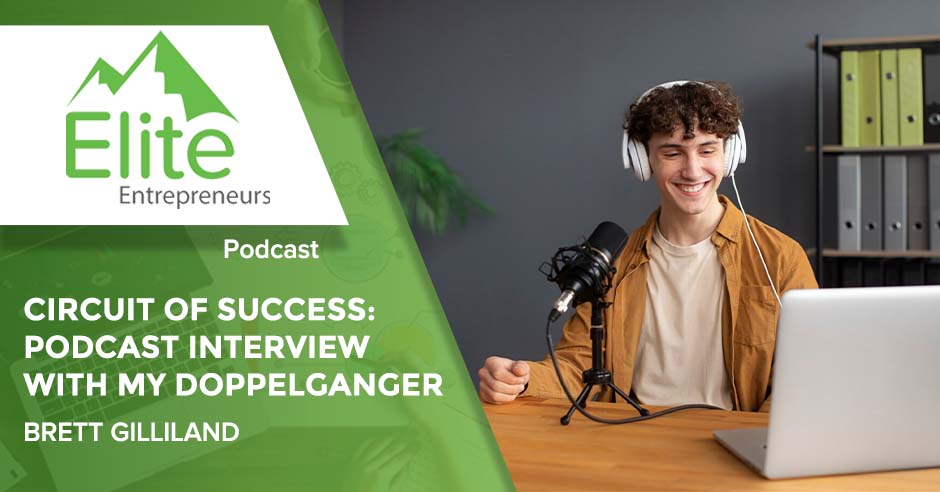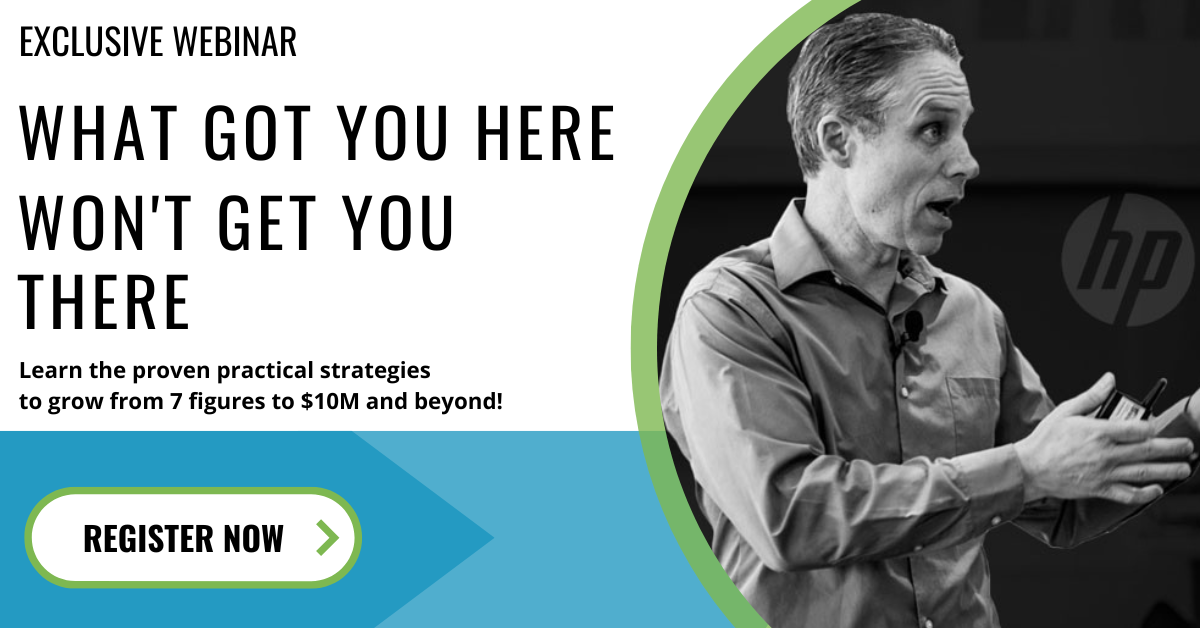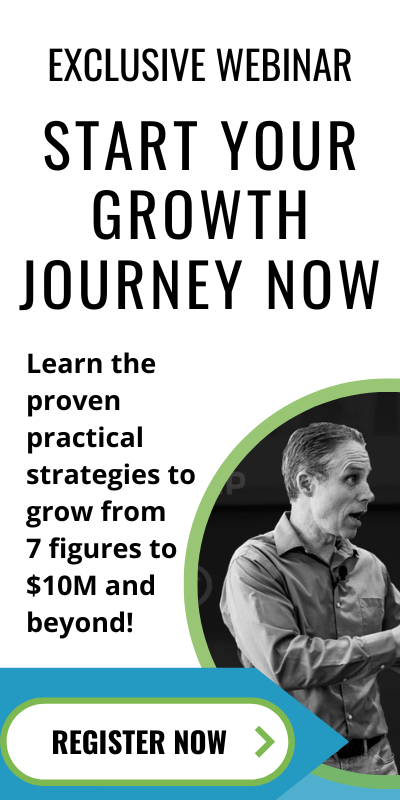Episode 157: Circuit Of Success: Podcast Interview With My Doppelganger, Brett Gilliland
You did not read that title wrong. There is another Brett Gilliland out there and he is every bit as amazing as our host, you guessed it, Brett Gilliland. And Brett Gilliland, our guest, is also a podcaster! What are the odds? Brett Gilliland, our guest, is the host of Circuit of Success, a podcast that give listeners a portal into the lives of success-driven people and help them achieve a future greater than their past. Off-mic, Brett, our guest, is the CEO of Visionary Wealth Advisors, based off of St. Louis. This conversation is more than just a meeting of two people who share the same name; it’s also a meeting of minds driven by the same passion for bringing out the best in people and showing them the way to success. Strap yourself in for a wild ride and tune in!
—
Watch the episode here
Listen to the podcast here
Welcome to this episode. I’ve done many episodes, well over 100 at this point. Maybe to some, that’s not many. I’m like, “That’s a lot of episodes,” but I’ve never done one quite like this one except for that one time I was on the other end of this episode. My guest is none other than Brett Gilliland, which is fun to say. Welcome to the show, Brett.
It’s good to be with you, Brett Gilliland.
This came about because Brett and I ran into each other on LinkedIn. It was a few years back. Somebody got us confused. Maybe I was curious. I don’t remember what happened, but I was like, “There’s another Brett Gilliland out there, and he’s doing cool stuff.” It turns out we both have shows. One day, we said, “Wouldn’t it be fun to interview each other on a show?” We did that on Brett’s show. Why don’t you tell us a little bit about your Circuit of Success podcast so that people know about that? We will then get into your business in our normal interview.
It’s one of those things that an idea became an action and a passion over the last few years. I interviewed my 382nd person. It has been amazing. It’s not my day job, but it is something that I love to do. I have anywhere from professional athletes to businesspeople to authors. You name it, we have probably had it. It has been incredible, and it helps our firm. It helps me as a leader. There’s no doubt about them. It’s a classroom with people every single week. It feels like I’m in their classroom. There has been a ton of fun in getting to know people like you from all over the country. What a small world it is.
Why don’t you tell people if they’re interested in checking out the show? What would they expect to tune into? One might assume this is about successful people sharing principles of success but how would you tee that up so that they know how to filter?
Be the habits, the mindset, and the rituals you see from all different walks of life. I had a guy who was blind, and he canoed the Grand Canyon and climbed a mountain, and normal everyday people as well. I’m finding out what makes them tick and what the lessons they have learned on their journey to success are.
We talk about attitude, beliefs, mindset, actions, and results, but we also get into tough conversations about things they have learned, things they have struggled with, and how they got through them. There are probably a lot of similarities between the things that you’re doing on your show and trying to help people achieve a future greater than their past. That’s what we get up and do every day at our firm and also on the show.
You referenced your day job and mentioned the firm. Let’s transition to that. I highly recommend those of you who are interested in hearing everyday people and everyday stories talk about the keys to their success. Brett has a great show. Check that out. Let’s talk about your “day job.” It’s Visionary Wealth Advisors. You’re based out of St. Louis.
We have eight office locations around the country, but we’re housed here in St. Louis, where the home base is.
You’re serving the whole country.
We have clients in 47 or 48 states now.
Talk about the primary services you are providing so that if anybody is interested in checking out what you are doing at Visionary Wealth, they can look into that.
We’re an independent RIA, a Registered Investment Advisory firm. Thanks for asking. We help successful people make great decisions with their money. There are a lot of things that go on out there, and you hear this and you hear that. What we try to do is focus on the planning side of that. A lot of our clients own businesses, executives, athletes, or whatever it may be. There are a lot of moving pieces in their lives, real estate, other businesses, or investments. They have to bring everything together. Hence, the name Visionary. It’s what the future could or will be like.
One of the benefits of working with us is we have clients who have already been there and done that. We’re helping those 40, 50, 30, and 60-year-olds navigate life to the craziness that we all have with kids, businesses, and all the stuff that we want to do. That’s it. We do retirement planning, education planning, vision planning, life planning, and investments. We wake up every day blessed to get to serve our clients day in and day out.
You mentioned helping them do things that they don’t have to figure out on their own. They can learn from others who have done it. Let’s transition to what this show is about. You’ve built something significant as a business owner, and there are lessons that you’ve learned that some of our audiences shouldn’t have to learn all on their own. They can at least learn from some of the things that you’ve done. That’s the purpose of our show. Let’s dive into that.
I said before we hit record that I do honor it for every entrepreneur who got something off the ground. We went through that scrappy and gritty founder thing and got their baby off the ground. They got this thing launched. I honor that, but what we focus on here is once you start having a growing team and have a seven-figure business, then there are some new things you have to figure out to continue scaling that business.
I would like to transport you, if not in space, at least in time, in your memories back to that time in your business progress. You could briefly share what it was like for you to start to make the transition from learner of all things to now leader of people, and somebody had to figure out how to build a business.
It makes me think of an exercise I went through in 2016-ish. We had an exercise with our executive team. There were 4 or 5 of us in the room. I said, “Everybody is going to write down the top ten things that they think they do for the firm. You write them all down in a journal and present this idea. Everybody goes around the room and starts presenting what they do for the firm.”
We like to vote. We joke around about it, “We’re going to have some fun. We’re going to vote.” It’s funny. The things that I thought I was good at doing and the things that I thought they needed me to do were the things they didn’t want me to do, “Get out of that thing.” I’m good at flying high at a 100,000-foot view, but getting in the weeds, I may get in the way. For me, it was a humbling exercise. When you start something, it’s your baby. One day, you’re the CEO and the janitor.
The hardest thing for me was to be able to let go. I don’t micromanage, but it is not needed as much in certain areas and aspects of the day-to-day business. For me, back in 2016, it was hard to know that I didn’t have to have my decisions, my voice, and my fingerprints on every aspect of the day-to-day business. It was emotionally tough for me to understand that. Hopefully, that answers your question. That was probably one of the toughest ones for me.
It does begin to answer because I want to dive into that even further. You mentioned 2016. We’re about to turn the calendar on 2024. To go from where you were then to where you are now, is there anything practical, concrete, and tangible you could point to that helped you begin to let go? It’s hard for business owners to let go of those things. They derived some personal satisfaction from doing those things. It felt like, “I know how to do something well. I’m adding value here. We have to let go of this.” How did you start to let go?
Part of it is by practice. You have to do it. Sometimes, you have to have faith and trust. When you have amazing people who are much smarter than you and work with you, and they’re capable of handling it, it’s like, “If I’m putting dollars toward this person every two weeks, and I trust them, I like them, and I know they’re going to do good work, I need to probably do that. I need to have faith.”

Circuit Of Success: Sometimes you need to have faith that you have amazing people working with you who are much smarter than you.
That’s one of the things in the Circuit of Success. We talked about faith in the higher power, but it is more like the faith that the person is going to get the job done, trusting it and then getting out of the way. From the books I’ve read to podcasts I’ve listened to and leaders that I’ve studied, that’s what I have found. The best leaders show a vision and then get out of the way.
The best leaders show a vision and then get out of the way. Click To TweetThat’s what I felt like I needed to do. When I would do that, and then it would work, it was like, “This is nice. I don’t need to be involved in that thing, whatever that is.” For me, it was trial and error. Do it, sneak back in a little bit, and try to do it, “I’m supposed to come back this way.” It was having trust, faith, and great people behind you or around you. That’s the hardest thing for me, too, “I know I can do this. I can hire another person,” but sometimes it’s hard when it’s our hard-earned dollars. When you’re a business owner, that’s money you don’t bring back to the family anymore if you look at it that way.
It’s having trust and faith that if I hire that extra person, then it’s going to allow me to do A, B, and C differently and let go of this piece of the pie, and then I can do what I’m uniquely qualified to do. We found in that exercise with 10 things that there were 3 things that they wanted me to do. It gave me permission per se to go out and focus on those three things. It has been probably the most clarity and most peace I’ve had in my business life ever. Using that word, I was given permission to do those things.
I don’t know where you picked up the exercise, but I love the idea of you writing down what you thought was important and then comparing it or juxtaposing it against what they were telling you, and then for you to have enough even self-esteem to say, “I can let go of those things that they’re telling me and have enough belief and faith that it’s going to go well.”
I like the P word you used, which was practice. Not all these things are like, “Flip the switch. One day, I’m this, and the next day, I’m that.” It’s usually more of a gradual process. Try it out a little bit, dip your toe, and see, “That worked fine. Nothing fell apart.” I love that principle. Let’s think about the complexity. As your team starts to grow, it’s one thing to start to step away as an owner and let other people take things. It’s another transition to start to build a real leadership team because, at first, it’s you and a bunch of people, and then it’s like, “I need to have some leaders around me.” Could you talk to me about some of the lessons you learned as you began to build out a leadership team?
To build the leadership team takes money. It takes money to go out and hire the right people because you can’t hire somebody and they’re all of a sudden a leader. In leadership, there has to be mutual respect. To dovetail a little bit there, I have a business partner, Tim Hammett. He’s the cofounder and president. I’m the Cofounder and CEO. His strengths are my weaknesses, and vice versa. That helps. We brought somebody from the outside in, Ryan Barke.
One of those things is we hire people smarter than you and better than you in what they do. Get the hell out of the way. What I have had to learn is to do that, but then that person also has to bring their A-game. We have almost 40 advisors, and these are super successful advisors. These aren’t the new guys or gals that started six months ago or a year ago. Our folks are 15 years up to 45 years in the business. These are legitimate and very successful advisors. Their expectations are as high as they should be.
When you bring a leadership team in, they have to bring their A-game. What you’re looking for is the talent that you bring in. Find the right people who can have the right discussions, be transparent, be vulnerable, and share a message, “From the top, this is what we’re about, and this is what we’re going to do,” but can also hold their feet to the fire and say, “That’s not what we’re going to do. We’re going to do A, B, and C.” Everybody knows that, but the caliber of people matters. Trust matters. Mutual respect matters, and then having faith to hire the right people. Get the right people on the bus. That has been what I’ve found to be one of the biggest deals.
It sounds like you and your partner, Tim, have very complimentary skillsets and strengths. You bring in somebody from the outside to build this leadership team further. I have no idea, but I’m curious to know. Was there any difficulty in onboarding a leader or bringing in from outside a capable executive leadership that then might impact our culture or our way of doing things here? What were their concerns about that? How did you deal with that?
We talk a ton about values in our organization. If we’re not values-aligned and mission and vision-aligned, it’s never going to work. The nice thing about Ryan is I knew him personally. We coached basketball together. Our kids went to the same school, and we had mutual friends. I’m sure he’s doing the same thing to me, “Is this a good person that I want to take my career to?” It’s the same thing for me, “Is this somebody that I want to bet on?” We had that. You work on it, build that relationship, and spend a lot of time. Ryan and I talk every day. We probably go to lunch 3 or 4 times a week together. You have to spend that time and energy together. When you do that, good things can happen when your values are aligned.
Good things can happen when your values are aligned. Click To TweetThe value alignment is huge.
We have done things in the past that were not values-aligned. It doesn’t work. You’ve learned lessons over time, and it does not work. Another one of my biggest learnings in business is to trust your gut. Your gut is usually right.
In this case, the gut is about values alignment. For some reason, we’re taught or we learn how to assess a candidate based on qualifications, experience, and background stuff, and we’re less trained or less naturally drawn toward that values alignment. Until you have some hires that go the wrong way because of the values alignment, then you say, “There’s something else that matters here.” What have you learned that has helped you become a better selection person or a better interviewer around values that might be of help to another business owner?
We have a hire that starts in January 2024. That was a process. Sometimes, we can be jaded in our thinking and not get feedback, “This is the right person,” but our interview process is more along the lines of getting my input and Tim’s input but also getting Ryan’s, Lauren’s, Taylor’s, Robin’s, and all these people’s inputs. We set up a visionary day, and they will come in. We even have 3 or 4 advisors spend time with them. We’re getting this cross-pollination. We all come from different backgrounds. We’re all in the same financial industry, but this one came from that industry or that type of brokerage firm, and this one came from here.
We have different perspectives. We’re getting those perspectives now through a pretty deeply engaged process. For me, that’s good because now, it’s feedback. We have all heard of the 360-degree approach. It used to be, “It was me. We will make the hire. Tim, make the hire,” but now it’s getting more people involved, and then you get buy-in. If I get buy-in from our culture, it’s not, “That’s Brett over there. He is going to hire another crappy person.” We all did this. If this one sneaks through the cracks here, we all messed up on that one. We have buy-in that. The advisors can take that out to the marketplace and enjoy that person as well.
I love that you brought that up. I could not have anticipated that we would be talking about this. That concept of involving the team isn’t just to get more perspective, which you pointed out. That’s true. Let’s make sure we see this from every angle we possibly can. When they all say yes to this candidate, now they’re intrinsically motivated to help that person succeed.
They’re sitting there and waiting, “Let’s see how Brett’s pick went.” It’s like, “I said yes to this and want to be right. I’m going to do everything I can to help that person succeed.” It’s so powerful. It’s something that I learned a long time ago as well, but I don’t know if I’ve ever had one of my interview guests bring that up. I’m so lucky. When the team says yes, the team is not just bought in, but they’re invested in this person’s success. They’re like, “I said yes to this. I want to be right.”
As leaders, we’re pretty quick to know in our gut what we feel. For this last hire, it was only one meeting. I talked earlier about letting go and getting out of that process, “In this role, I’m not going to be the person doing the day-to-day work with that person. Who am I to say? Person over here, you’re going to be working with this person over here. You two have never met, but I made the decision because I’m the CEO and the cofounder.” People are going to work together every day. Let’s make sure they connect and that they want to work together.
There are so many forces fighting against this because we posted the job in the first place because our hair is on fire, “We’re already behind. I needed somebody yesterday,” and then we fall in love with the resume. We’re like, “This is it. It’s finally it.” We want to run and plug people in, “Let’s go.” We have to slow down and say, “If I get it wrong, that’s so costly and disruptive. It’s a waste of time and money. If I get it right, it’s so beneficial. How can I increase the chances of being right?” It sounds like you have an extensive selection process. What else does it look like, not just involving other team members? Are there multiple steps or multiple interviews? How do you do it?
We have the initial interview that somebody will hold. Let’s say there are fifteen candidates for that position. They will narrow that down to 2, 3, or 4 people. You never know. Tim spent a fair amount of time with them in this last one. That’s more on his side. He will be spending a lot of time with that. We have to make sure the values connection is there. If it’s a values connection with him, it’s going to be a values connection with me because we’re locked and loaded on that. I don’t ever have to worry about that. I don’t have to manage that. It is what it is.
We don’t do personality tests. Maybe we should. It’s more of values. I don’t mean to keep saying the same thing. We have a short show here, but it is that connection, being a good person, and having good energy and a good attitude. We call it the no-asshole rule. If we can’t go to a conference, let’s say, and I don’t want to go to dinner, or we don’t want to spend time away at a conference together, do I want to work with you every day? The answer is no. That no-asshole rule for us is huge. You could ask anybody in our firm, “What’s the rule?” They say, “The no-asshole rule.” That’s what we do and that’s what we stand for. We try hard to do that.
I don’t think we fully appreciate as business owners how crucial it is that we get hiring. Academically, I’ll say it, but when it comes down to it, we don’t invest enough time and energy into getting this right. I love hearing examples like yours where you involve the team and get clear on the values. That’s it. I’m with you. Some people like their favorite personality assessment. I have nothing against that, but to me, none of those personality assessments will check against my values. There might be some overlap but I want to check against my values.
We’re very clear. Hats off to Tim for this, my business partner. The job description and the details that go into this job description are signed off, “This is what we are hiring you for.” We are going to be crystal clear on what you’re being hired for so that when you’re in here, it’s not, “I didn’t know I was going to have to do this or that.” Tim beats that drum, and it has been a game-changer for us over the last couple of years to have a crystal clear job description, “This is what every single person on the team is going to do,” and then follow that job description.
It’s total clarity. There’s nothing like it. Accountability is one of the favorite words of business owners, “Why can’t they be more accountable? I wish I could hold people better accountable or I was better at holding them accountable,” but in my mind, that means they haven’t been very clear with people about the expectation.

Circuit Of Success: You can hold people accountable better if you’re clear about your expectations.
When you’re saying that word, I’m like, “How am I going to answer that?” We don’t have a lot of accountability in our firm from a standpoint. Do the right thing, be compliant, don’t be an a-hole, and all those things but I don’t have to say, “Make sure by Friday at 5:00 this thing is done.” Get it done. That’s the expectation. If you don’t continue to get it done, there’s going to be a discussion but there’s no accountability because this is the expectation.
Give them the power. If an email comes in, and you need this one thing, the thing we have to be better at is, “I got the email. Let’s respond and give a stated time.” That’s what we’re doing now, “What’s a stated time I can get this done?” You said the time you could get it done. If it was by Thursday at 2:00, then you better have it done by Thursday at 2:00.
Every time, you’re making little improvements around clarity. It’s clear expectations and clear deliverables. You said, “We don’t have to do accountability around here,” but you’re saying to me that you have a bunch of accountable people because they have clear ownership. They know exactly what’s expected. It has been spelled out from the beginning. They took full ownership of that and said, “Give me that baton. I got it.” The accountability naturally follows.
From the beginning of this time together, you said, “I had to learn how to let go. I had to trust others.” You made some great points about that. If not the first thing in your leadership journey, maybe that was an early part of your leadership journey. As you continue to push yourself to be a better leader, what’s one of the biggest things that has made a difference for you, whether it’s a practice, a mindset, a resource, or anything that you feel to share around leveling up your leadership game? At the end of the day, when you stop doing work, it all becomes about leading more effectively. What are you doing to be a better leader who might be useful to somebody else?
I hope somebody will answer that if you ask them about me. I stay a student of the game by constantly working on myself through others. What I want to do is help people achieve a future greater than their past, our firm’s mission, by everything I’m working on and giving ideas, strategies, and thoughts around that, whether it’s a client or an advisor in our firm. That’s my biggest role. I see our clients and advisors, do things in the community, like podcasts and other things like that, and sit on boards. That’s important.
When people know you work on yourself and you value getting better, they know that if they have a meeting with you, you’re going to help them try to be better, not that you’re going to change their life in one meeting, but you’re trying to help them get 1% better every time. For me, it’s constantly journaling. It’s strategic think time on Wednesdays from 1:00 to 2:30. It’s sitting down with a journal and an ink pen on myself with no technology for an hour and a half and thinking. Early on, that was brutal to set an hour and a half. I’m like, “What the heck am I going to talk about?” Now, I cherish that time. I look forward to that time.
For anybody reading this, I know you’re busy. I know you’ve got a lot going on but if we can slow down and have strategic thinking time for an hour and a half a week, I promise you that great things will happen. Stay focused on the mission, the vision, and the values of the firm. That’s where ideation happens. That’s where creation happens. For me, that has been one of the biggest game-changers, along with journaling. Another step I would say, is going out of the office four times a year on a retreat. I’ll do it by myself for a day and then spend a day with our team outside of the office. You’re working on your business and not in your business. That recipe has been very successful for us.
Stay focused on the mission, the vision, and the values of the firm. That's where ideation happens. That’s where creation happens. Click To TweetThat personal routine of weekly think time with yourself, your thoughts, and your paper and pen is so powerful, especially, as you described, going from the discipline of making yourself do it at first, “This is hard. I don’t know what I’m doing.” Cherishing and having that clarity time is powerful. You didn’t equate it to it, but then, to throw in a similar rhythm for organizational clarity, we need to get together on a quarterly basis. There’s personal clarity about yourself and the business. There’s business-level clarity when you bring the team together. That’s exceptional counsel to be sharing with others.
If you see my phone, every Wednesday at 1:00, it vibrates for two minutes because the whole week leading up to that, I’ll say, “Siri, remind me on Wednesday at 1:00 to think about A, B, and C.” When all those reminders come off at 1:00, it’s my job, wherever I’m at that moment in that strategic thinking time, meaning emotionally or mentally, to check the one that I want to go through. It may take the whole hour and a half for that one. It may take five minutes. I might say, “That’s not important anymore. Delete it. Get rid of it.” If it doesn’t, then it’s, “Remind me next week.”
They may stay on the Siri reminder list for four months. Who knows? Every Wednesday at 1:00, those reminders are coming off, and they’re there to remind me of things I need to think about, whether lying in bed at night. Maybe I shouldn’t have my phone next to me. I know a lot of people on shows tell you, “Don’t do that.” “Siri, remind me on Wednesday at 1:00 to think about A, B, and C because this thing was going on in my brain.” What I found is when I can get it out of my mind and onto my process, I can go to bed a lot easier.
You have a placeholder for that. Your brain knows, “I’m not going to drop that. It’s not going to fall through the cracks. It’s safely captured.” You can be at peace. I love that very practical thing you’ve created, “Siri, on Wednesday at 1:00, all those reminders are coming in.” That’s fantastic. Brett, I’ve had such a great time. Thank you for saying yes to an interview on our show and sharing many practical leadership lessons in your growth journey. It’s super valuable. Thanks again.
Thanks for having me, Brett. I appreciate the time.
Last chance, if you wanted to share with others how they might reach you, whether it’s about your advisory firm or checking out the show, where would they go to do that?
You can go to VisionaryWealthAdvisors.com. You can go to CircuitOfSuccess.com for the show. I’m on all the major social media platforms. My plug is my journal. Achieving a Future Greater Than Your Past is on Amazon. That’s my whole process. That’s how I live every 90 days. I’ve taken the last few years and put them all into one spot. Every single day, I use this journal and then my blank journal for my writing. That’s what I do. Find me on social media. Find me on those websites. Check out the journal on Amazon. I’m creating videos to help people understand that journal. It’s a process to go through, and it’s something that will help your audiences.
Thank you, Brett. I’m sure we will be running into each other out there on the internet. People confuse us and our shows, but it was fun to interview you.
It was fun interviewing you. People should check that out as well because you won’t plug yourself but you can go to YouTube or CircuitOfSuccess.com and see Brett Gilliland‘s interview with me.
That was fun. Everybody, please continue to do all those things and share them with others. We’re trying to help as many seven-figure business owners as possible learn from great people like Brett about the real lessons they’re learning as they move along their growth journeys. Thanks. We will see you next time.
Important Links
- Brett Gilliland
- Circuit of Success
- Achieving a Future Greater Than Your Past
- YouTube – Circuit of Success
- Brett Gilliland – Circuit of Success episode
About Brett Gilliland
 Brett Gilliland is the Founder and CEO of Visionary Wealth Advisors. In this role, Brett partners with clients and financial advisors helping them to achieve their biggest dreams and aspirations by focusing on what he calls “F to the 5th Power” – Faith, Family, Fitness, Firm, Fun. Brett embraces the firms’ mission of “helping clients achieve a future greater than their past.”
Brett Gilliland is the Founder and CEO of Visionary Wealth Advisors. In this role, Brett partners with clients and financial advisors helping them to achieve their biggest dreams and aspirations by focusing on what he calls “F to the 5th Power” – Faith, Family, Fitness, Firm, Fun. Brett embraces the firms’ mission of “helping clients achieve a future greater than their past.”
Brett hosts a weekly podcast, The Circuit of Success, which was rated as one of the top entrepreneur podcasts in 2017. He serves on the Board of Directors for the St Louis Sports Commission, Brace For Impact, the St. Louis Zoo and Southern Illinois University Edwardsville (SIUE) School of Pharmacy. Brett and his wife, Julie, also founded Swing Fore Hope, a charity that funds cancer research and provides financial assistance to cancer patients. They have 4 sons, Max, Drew, Hudson and Asher.
Want to listen to more? View all episodes here >



